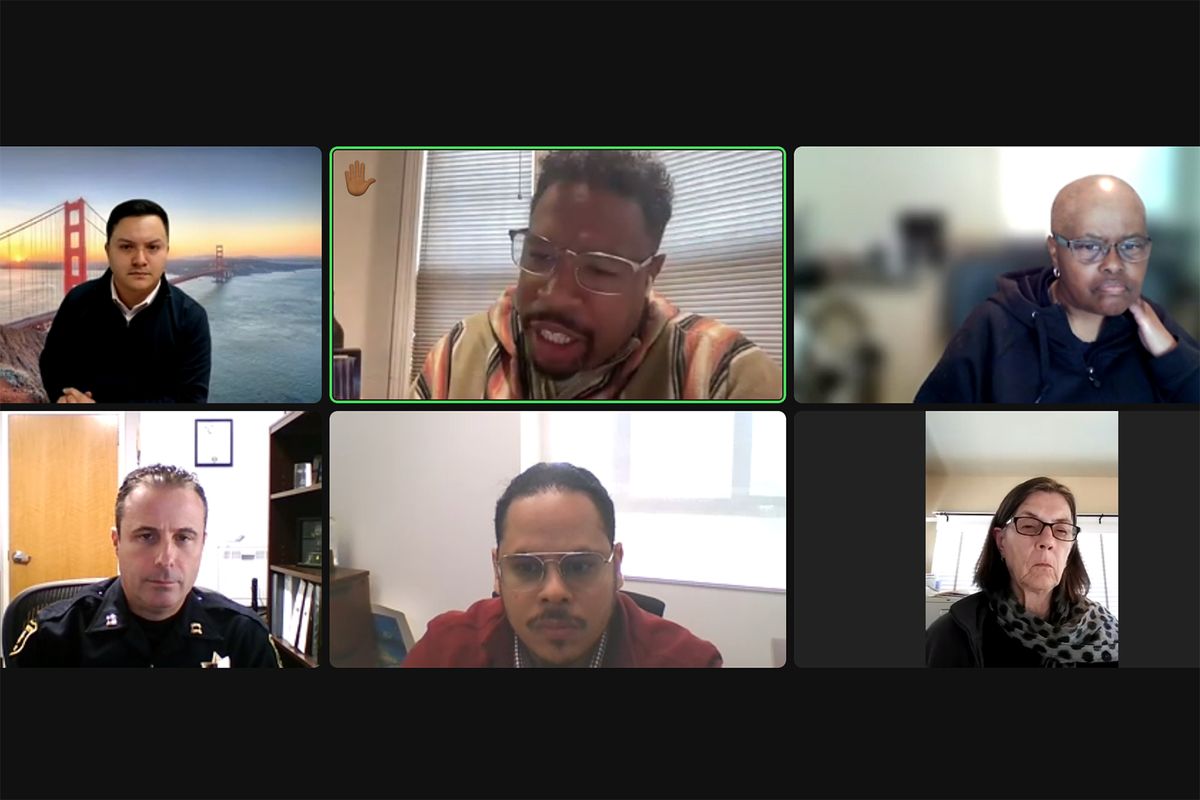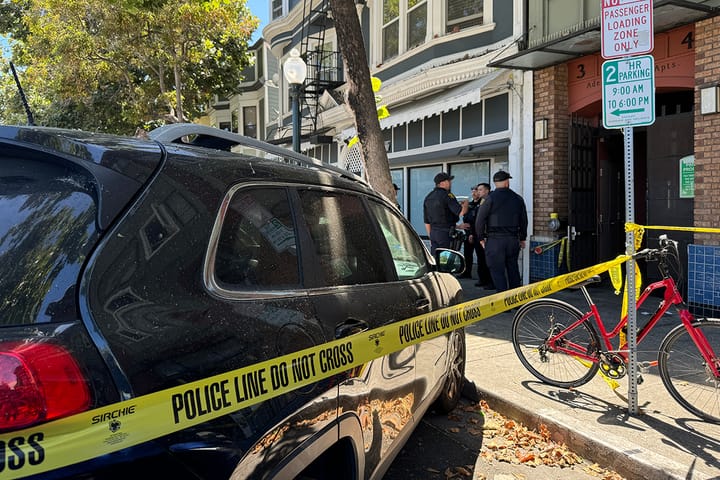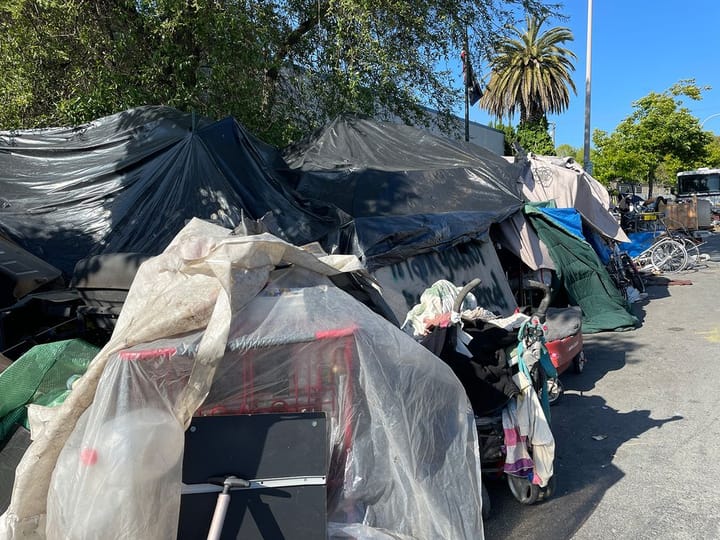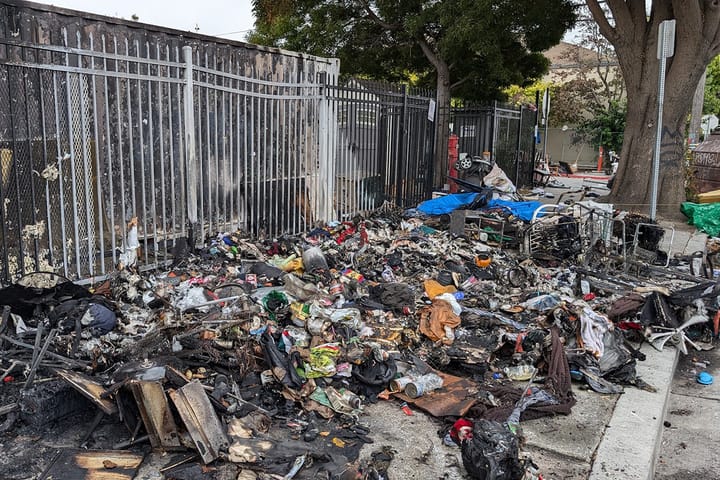Police Accountability Board text scandal review has begun
The board will soon seek applications from members of the public who wish to join the police misconduct inquiry.

Members of the Berkeley Police Accountability Board continued to lay the groundwork this week for how they will research a litany of police misconduct allegations raised in November by a fired police officer.
PAB members say they plan to look at everything from arrest and overtime data to termination records and personal cellphone use policies as they get their bearings on what has already chalked up to be BPD's biggest scandal in more than a decade.
On Wednesday, the three-member PAB subcommittee in charge of the sweeping review held its second meeting to plan how to proceed.
"We have to get to the facts first," said Cheryl Owens, subcommittee chair. "We haven’t even established whether or not the allegations are true."
The allegations, put forward by former Berkeley police officer Corey Shedoudy, include arrest quotas and "questionable legal tactics" within the department's Bike Force, a proactive patrol team that was supervised by veteran BPD Sgt. Darren Kacalek.
Kacalek has been a central figure in the scandal because of his leadership role and also because the misconduct claims included screenshots of alleged bike team group chats that appear to show offensive text messages that he wrote.
Kacalek was placed on administrative leave and stepped down from his role as police union president after the allegations came to light.
According to Shedoudy, who was on the bike team, the questionable tactics included "stop and frisk, probation searches with no reasonable suspicion of a crime, and a very loose interpretation of stay-away orders from UC Berkeley."
Officers familiar with the bike unit say there were no quotas or illegal practices and asked why — if such things had happened — had Shedoudy not raised concerns immediately to command staff, or brought it up when he was first put on leave in late 2020.
PAB review is focused on policy, not discipline
Two investigations are now taking place in Berkeley in relation to the police misconduct claims: a confidential probe by a San Francisco law firm hired by the city and the more public process by the Police Accountability Board subcommittee.
Both inquiries are seeking to determine the veracity of the misconduct allegations, but there will be critical differences between them.
The law firm process will take the place of BPD's internal affairs investigation and could result in discipline if the misconduct claims are substantiated. Because it is a personnel investigation, the process will be confidential.
Related disciplinary records could eventually become public depending on the ultimate findings — but that may well be years into the future.
Meanwhile, although the PAB process is expected to have confidential elements, much of its work will take place during public meetings and discussions.
The effort will take the form of a policy review involving an intensive assessment of the facts to find out whether any BPD policies need to be changed.
The review will not result in disciplinary recommendations, however: The board is not allowed to initiate its own disciplinary proceedings under the city charter.
And, while the two inquiries are separate, city staff has said there will be coordination between them, in part to ensure no aspects of the law or due process are compromised.
A chance to see what the Police Accountability Board can do
Hansel Aguilar, the city's new director of police accountability, said what happens next will demonstrate, for the first time, one of the Police Accountability Board's primary responsibilities and the scope of its powers.
The board has already discussed plans to issue subpoenas, as well as how to ensure it has access to all of the records it is authorized to review under the city charter. That includes confidential personnel records that are not available to the public.
"This is a good opportunity for the community at large to see what an oversight entity could do when it's looking at the policies of the department," Aguilar told The Berkeley Scanner this week.
In late November, Aguilar made an initial data request to the city regarding the Shedoudy misconduct allegations.
He asked for background on BPD's Bike Force, which grew out of a Downtown Task Force formed in 2019 in response to merchant concerns. He asked about where the unit had worked in the city and what hours it had operated, as well as its size over time.
Aguilar also asked for stop data related to the bike unit: all interactions leading to arrest as well as those that did not.
The police department has said it is working with the city attorney's office to determine what material it can provide, and hopes to begin making information available to the board in December.
"As this is an extremely serious matter we want to ensure that we follow all processes precisely," Berkeley Police Chief Jen Louis told Aguilar, according to emails reviewed by The Berkeley Scanner.
On Wednesday afternoon, subcommittee members Owens, John Moore III and Kitty Calavita spent most of the meeting brainstorming about what other questions to ask the department as the work proceeds.
That included determining which police captain or captains oversaw the bike team during various periods; finding out which officers were in the alleged bike unit group chat; and figuring out what, if anything, the Berkeley police chief knew about the misconduct allegations.
Corey Shedoudy termination will be part of inquiry
Board Member Moore said it will also be important for the subcommittee to find out how Shedoudy lost his job and to get his disciplinary file.
"To me, there’s a disconnect," Moore said. "We didn’t know anything about this situation and we’re the oversight board."
The Berkeley Scanner broke the news last month of Shedoudy's termination. He was fired last year after intentionally colliding with a car on his bicycle, according to numerous Berkeley police sources familiar with the crash.
He then filed a false police report and a false workers' compensation claim, which led to his termination, according to multiple veteran officers familiar with that investigation.
As of November, Shedoudy was still appealing that decision, he told city officials when he made the misconduct allegations about his former bike unit and Sgt. Kacalek.
Also in November, Shedoudy filed a lawsuit against the driver from the collision, according to court records discovered by The Berkeley Scanner while reporting last month.
On Wednesday, board members said they would like to invite Shedoudy and other Berkeley police officers for confidential interviews as the inquiry proceeds.
Board Member Calavita said the subcommittee should also seek records from Shedoudy's recent arbitration hearing if that process is complete.
"One of the things he says in his email is there was a lot of information that came out of that," Calavita said. "That information would be really important."
Police Accountability Board to seek public members
The board has also begun compiling BPD policies that could be relevant to its review, such as those covering electronic communication, search and seizure, discriminatory harassment, standards of conduct, fair and impartial policing, and more.
Board members also briefly discussed the process for bringing members of the public into the discussion: Community members can watch meetings and comment at certain times — but they will also be able to apply to join the subcommittee itself.
The application should be available soon, staff said. The board discussed the possibility of getting public members onto the subcommittee as soon as January.
Public members will not be privy to the board's confidential records or discussions, but they will otherwise have a seat at the table.
Aguilar said, in general, it would be important going forward to steer clear of questions or topics in public that could jeopardize the parallel investigation into possible officer discipline.
Board members agreed.
"There will be some information that we’re not going to be able to share with the public," Owens said Wednesday. "But we will do our best to make sure to share the things that we can share."
Learn more about police accountability efforts in Berkeley on the city website.




